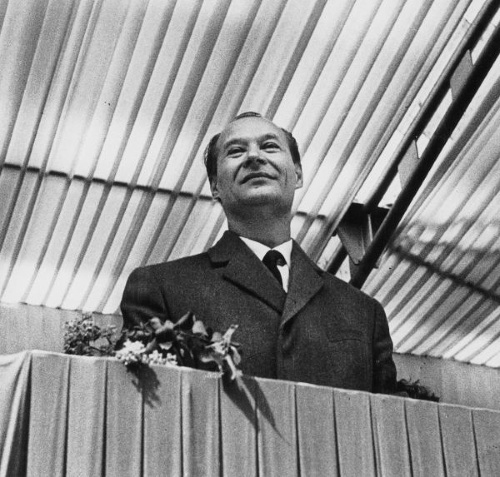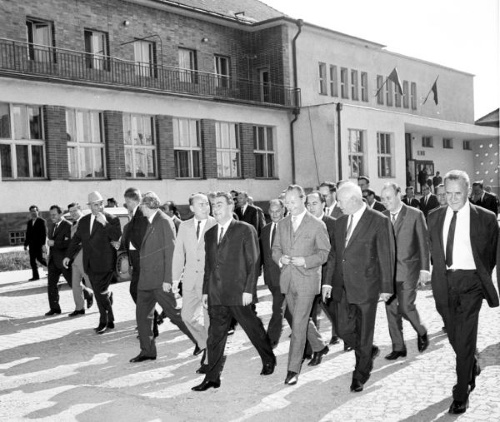“The events of 1968 must be remembered all the more because more than half a century has passed since then. The monuments are older and the politicians who were interested in what was happening at the time are no longer alive. for an extremely hard military invasion, in which more than 100 people died by the end of 1968, of which more than 20 in Slovakia, “ said historian Patrik Dubovský from the Institute of the Memory of the Nation.
The number of victims associated with the invasion and the presence of Soviet troops is estimated at more than 400. It was the largest military action in Europe since the end of World War II. In addition to the Soviet Union, other Warsaw Pact states – Hungary, Poland, Bulgaria and the German Democratic Republic – also took part.
Source: TASR – Milan Kapusta
Unjustifiable interference
“It was an unjustifiable intervention, which Europe experienced very little – for example, Hungary in 1956, or some actions in Poland, which was relatively short after the end of World War II. In the 60s, however, disagreement with reforms did not have to to deal in such a hard way, “ Dubovsky explained.
The Day of the Victims of the Occupation of Czechoslovakia in 1968 was included among the commemorative days by an amendment to the Act on Public Holidays, Labor Holidays and Memorial Days, approved by parliament on November 3, 2020. The occupation is also commemorated on June 21.
No democracy
The armed invasion on the night of August 20-21 forcibly ended the process of democratization, also known as the Prague Spring. The political recession in Czechoslovakia took place during the 1960s. In January 1968, Alexander Dubček became the first secretary of the Central Committee of the Communist Party. In April, the party leadership adopted the Communist Party’s Action Program, which contained several proposals for reforms – strengthening freedom of the press, expanding civil rights, economic change, better availability of consumer goods, and admitted the possibility of a multi-party government.

Source: profimedia.sk
The anti-reform part of the Communist Party expressed its disagreement with the ongoing changes. The Soviet leadership was also concerned, calling for vigorous action against anti-socialist forces in several negotiations. From 20 to 30 June, a military exercise of the Warsaw Pact was held in Czechoslovakia under the name Šumava, while Soviet troops postponed leaving the Czechoslovak Socialist Republic until the turn of July and August.
Members of the leadership of the Communist Party and the CPSU (Communist Party of the Soviet Union), led by Dubcek and Leonid Brezhnev, met in talks in a railway carriage in Cerna nad Tisou from July 29 to August 1. Shortly afterwards, on August 3, 1968, in Bratislava, representatives of the USSR, the GDR, Poland, Hungary and the Czechoslovak Socialist Republic signed the so-called The Bratislava Declaration, which also enshrined Brezhnev’s doctrine: the right of the Soviet Union to intervene in the Allied states. During the conference, the Soviet representatives were delivered the so-called invitation letter, which was a pretext for the invasion and which was signed by Vasil Biľak together with four other KSČ officials.
The Soviet leadership negotiated a move against Czechoslovakia on August 15-17, and a day later confirmed the joint military action of all five states involved. Intervention units of 750,000 troops with 800 aircraft, 6,300 tanks and 2,000 cannons and missiles crossed the border on August 20 around 11 pm. Their entry was announced in person by USSR Ambassador Stepan Červonenko to President Ludvík Svoboda.
Dubcek transported to Moscow
The leaders of the Communist Party, led by Dubček, were forcibly transferred to Moscow, where they were joined by an official delegation led by President Svoboda. Representatives of the Czechoslovak Socialist Republic under pressure signed consent to the stay of intervention troops (the so-called Moscow Protocol), as it was not the only one signed by the chairman of the National Front, František Kriegel.

Source: TASR
The agreement on the conditions and temporary stay of Soviet troops in the territory of the Czechoslovak Socialist Republic was approved by the parliament. The protagonists of the Prague Spring were gradually removed from office, resp. they resigned voluntarily. The normalization process has begun. The communist regime lasted more than 21 years until November ´89.
“It is also a lesson that we cannot negotiate decently and diplomatically with dictatorial and totalitarian countries, as Alexander Dubček did. It turns out that we should choose our allies very precisely who can help us at critical moments,” added historian Patrik Dubovský from ÚPN.
Download Songs of Boda – Garland Album Mp3 Zip
Download Carl Bastien – Viens donc faire un tour – EP Album Mp3 Zip
Download Bu Kolthoum – Talib. Album Mp3 Zip
Download Various Artists – Fight Club, Vol. 1 Album Mp3 Zip
Download N.O.E – Arche Album Mp3 Zip
Download Marshall Harner – Daydream Album Mp3 Zip
Download David Duchovny – Gestureland Album Mp3 Zip
Download Styles – Different Album Mp3 Zip
Download Donavon Frankenreiter – Live at the Roxy Album Mp3 Zip
Download Anti-Flag – 17 Song Demo Album Mp3 Zip
Download Orange Goblin – Healing Through Fire (Deluxe Edition) Album Mp3 Zip
Download Travis Book – Happy Hour House Band, Vol. 1 (Live) Album Mp3 Zip
Download SubDocta – Cataclysmic – EP Album Mp3 Zip
Download Murder Attic – Murder Attic – EP Album Mp3 Zip
Download KUNZITE – VISUALS Album Mp3 Zip
Download Pixel Terror – Empire EP Album Mp3 Zip
Download Ferry Corsten – Ferry Corsten – Anthems Mini Mix 1 (DJ Mix) Album Mp3 Zip
Download Sweet Crisis – Tricks on My Mind Album Mp3 Zip
Download Sascha Urlaub – Nocturna Album Mp3 Zip
Download AXEL HOLY, Jack Danz & Baileys Brown – God Comflex – EP Album Mp3 Zip
Download Matroda – Jack the House 2 – EP Album Mp3 Zip
Download Jane McDonald – Let the Light In Album Mp3 Zip
Download Roger Silver – Mission One – EP Album Mp3 Zip
Download Matt Fax & Estiva – Nova / Found – EP Album Mp3 Zip
Download Electric Fluid – First Steps (Live) Album Mp3 Zip